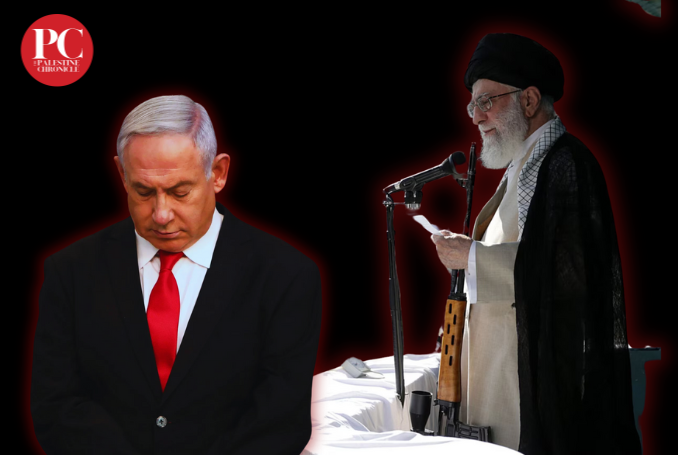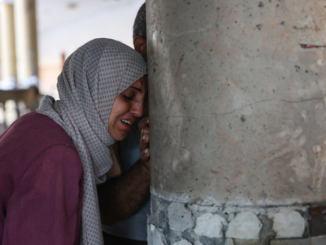
Writing in the Al Mayadeen Arabic website, Dr. Hassan Nafaa, a professor of political science at Cairo University discusses Israel’s perception of Iran as an existential threat due to its nuclear and missile programs, and the potential for future conflict.
Israeli Prime Minister Benjamin Netanyahu is currently experiencing a great sense of euphoria, believing that he is on the verge of realizing his dream of becoming the crowned king of Israel, which, under his leadership, has become capable of rebuilding the Third Temple.
He is fully convinced that he has destroyed the military capabilities of all Palestinian resistance factions, not just in Gaza but also in the West Bank. He believes that Hezbollah’s combat capabilities in Lebanon have been crippled and that the Assad regime in Syria has been toppled. Thus, for the first time in its history, the Zionist entity no longer faces any serious threat from its neighboring countries, once known as the ‘frontline states.’
Egypt has had a peace treaty with Israel since 1979, Jordan signed a similar agreement in 1994, Gaza has been completely destroyed, the West Bank is devoid of significant resistance, and the Lebanese border is fully secured after ensuring Hezbollah’s withdrawal beyond the Litani River. Moreover, Syria, which has been removed from the conflict, may now be on its way to signing a peace treaty with Israel.
In light of this overwhelming sense of triumph, Netanyahu is now focusing on Iran, which he dreams of defeating, especially after Trump’s victory in the US presidential elections. Netanyahu believes the conditions are ripe for a decisive strike that would overthrow the Iranian regime, which he perceives as impossible for Israel to coexist with. As such, he feels that the only option is to work seriously toward its downfall. How, then, will Iran confront such looming and potentially imminent dangers?
Iran’s Approach to Israel’s Threat
Since the inception of its Islamic revolution in the late 1970s, Iran has recognized that Israel poses a serious and real threat to it. However, it seems that Iran has viewed this threat as something that can be countered and neutralized indirectly, through allies and partners in the struggle.
Iran believed it could win against Israel over time by engaging in continuous attrition through these allies, rather than engaging in a direct military confrontation between Iran and Israel. For this reason, Iran did not hesitate to cooperate with any Arab parties that considered themselves, for one reason or another, in an armed confrontation with Israel.
Iran has indeed provided extensive political, military, training, and financial support to Hezbollah, which has fought successful military confrontations with Israel. These included armed resistance operations that led to the liberation of Lebanese territory in the south and forced Israel to withdraw unconditionally in 2000, as well as a comprehensive war aimed at its destruction in 2006, in which Hezbollah withstood and prevented Israel from achieving its goals.
At the same time, Iran successfully forged strong relations with several Palestinian armed factions, particularly Hamas and Islamic Jihad, as well as with Syria under the leadership of Presidents Hafez and Bashar al-Assad.
However, the developments following the Al-Aqsa Flood, which seems to have surprised everyone, forced Iran into a direct military confrontation with Israel for the first time in history. It is clear that Iran entered this confrontation reluctantly or even under duress, and it is likely that it has been striving to avoid it as much as possible.
Due to the scope of Israel’s provocations against Iran, it is impossible to list them all here. Despite many of these provocations warranting an immediate military response, Iran has only publicly stated its intention to conduct a direct military response on three occasions. When it did, it called the responses ‘The Promised One,’ but it only carried out the responses twice.
The first was on April 14, in retaliation for the destruction of the Iranian consulate in Damascus on April 1, and the second was on October 1, in response to multiple assassinations, including the killing of Hamas’ political leader, Ismail Haniyeh in Tehran, Hezbollah’s leader Hassan Nasrallah in Beirut, and other commanders of the Iranian Revolutionary Guard on different dates.
While ‘The Promised One 1’ was a clear demonstration of strength, Iran aimed to prove its ability to reach Israel and inflict significant harm. ‘The Promised One 2’ caused substantial damage to two important Israeli military bases, which prompted Israel to respond to this operation on October 25.
Although Iran quickly declared its intention to retaliate against this response, ‘The Promised One 3’ has yet to be executed, nearly two months after its announcement. This indicates that Iran is practicing restraint against Israel and carefully weighing its military actions based on many complex calculations, in contrast to Israel, which pursues a deliberately provocative and reckless policy toward Iran.
Israel’s ‘Existential Threat’ Perception
Israel views Iran as an existential threat not only because of its support for Hezbollah and Palestinian resistance groups but also due to its advanced nuclear and missile programs. Iran’s nuclear program has reached a stage where it could potentially develop a nuclear weapon at will, while its missile program enables it to manufacture hypersonic missiles and highly advanced drones.
Since Israel insists on monopolizing nuclear weapons in the region and ensuring the balance of power always tilts in its favor, it is not far-fetched to think that Israel might commit any folly, including launching an open war against any country in the region that is seen as acquiring the technical knowledge to build nuclear weapons or doing anything that would disrupt the regional balance of power.
This explains Netanyahu’s fierce opposition to the 2015 nuclear deal signed by the P5+1 and the significant role he played in convincing US President Donald Trump to pull the US out of this deal in 2018, imposing comprehensive sanctions on Iran. Netanyahu also worked to hinder efforts by the Biden administration to return to the deal later.
Now that Trump has won the 2024 US presidential election and is poised to enter the White House for a second and final term, Netanyahu believes the path is clear to convince Trump that the time has come to eliminate the Iranian regime once and for all.
It is noteworthy that Netanyahu maintains constant communication with Trump, who is being persuaded by some that Iran was behind the attempt to assassinate him during his election campaign, especially after the US election results were announced on November 5. Recently, US reports, including from the Wall Street Journal and Time Magazine, have stated that Trump and several key figures in his administration are now studying all available options, including the possibility of launching airstrikes to stop Iran’s nuclear program.
It seems that the prevailing opinion in this administration is now convinced that “economic pressure is no longer sufficient to contain Tehran, and therefore the military option cannot be ruled out.” While Trump is generally reluctant to use military means to achieve his political goals, preferring major diplomatic, economic, and trade deals, we must not forget that he did not hesitate to order the assassination of Qassem Soleimani.
He may find within his inner circle individuals who try to convince him that Iranian influence in the region has significantly weakened, especially after the heavy blows suffered by Hezbollah, Palestinian factions, and the fall of Bashar al-Assad’s regime. Therefore, US interests in the region may no longer be at the same level of risk.
No doubt, many reports will be placed before Trump showing that Iran is now a ‘nuclear threshold state, meaning it has the technical capacity to produce nuclear weapons. They will likely also attempt to convince him not to rely too much on Iran’s religious fatwa prohibiting nuclear weapons, noting that many clerics are now willing to issue a contrary fatwa, arguing that Iran’s national interest now dictates developing nuclear weapons as the only means of safeguarding its security amid the current regional and international circumstances.
The Possibility of Military Action
In an interview with Time Magazine, Trump was asked about the possibility of a war with Iran during his next term, to which he replied, “Anything can happen, it’s a very volatile situation.
A senior Israeli military official, in an interview with reporters published by Haaretz last Monday, confirmed that the Israeli Air Force is preparing for a major mission targeting Iran’s nuclear facilities. Other Israeli media outlets have suggested that a “historic opportunity” has emerged, one that should not be limited to strikes on nuclear facilities but should also involve the threat of toppling the Iranian regime and forcing it to sign a new agreement.
Given these circumstances, can Iran continue its hesitant defensive policy, or has the time come to shift to an offensive stance?
(The views expressed in the article do not necessarily reflect the editorial position of The Palestine Chronicle.)
(Al Mayadeen Arabic website – Translated and prepared by the Palestine Chronicle)









The mad “Israel” is trying to manage (or massage) the consent, in this case, in UK: Prof. David Miller covered the tiny – but telling – Pahlavi monarchists in pro-genocide demonstrations in London. I expect Pahlavi meeting Al Jolani and Trump in Mar-a-Lago soon.
https://www.presstv.ir/Detail/2024/05/01/724759/Israel-marshalling-Pahlavi-monarchists-in-pro-genocide-demos-in-London
WHY does the Palestine Chronicle give a voice to GARBAGE like this? israel IS defeated already. Not one Palestinian man woman or child will ever again permit israel to control them, so israeli control of the Palestinian Territories is no longer possible. israel cannot get out from under the decisions of the ICJ and ICC, and more and more Nations support those decisions. netanyahu has achieved Nothing— he has failed to defeat Hamas, he was battled to his knees by Hezbollah, he has not even located the hostages let alone rescued them, and he cannot defeat Houthi Yemen. Finally, Iran is supported as an Islamic State and Revolution by both Russia and China! israel is Nothing!